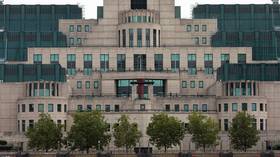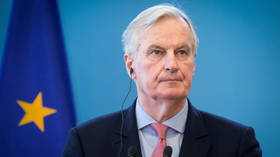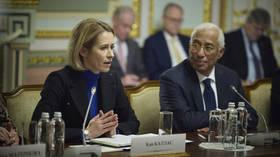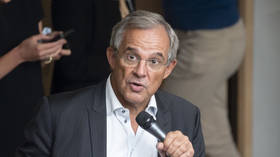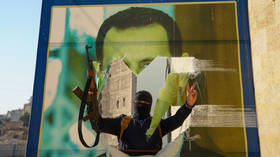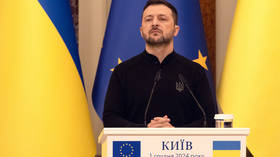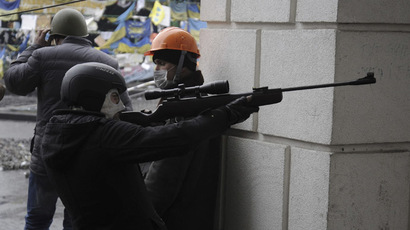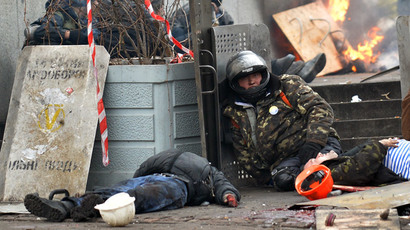Kiev detains Berkut officers in murky ‘Maidan snipers’ probe
Ukrainian prosecutors have detained several Berkut riot police officers, saying they may be behind the mass killings by unidentified snipers in Kiev on February 20. The new twist adds further mystery to the politically-loaded investigation.
The detainees belonged to ‘Berkut black company’, acting Prosecutor General Oleg Makhnitsky told journalists on Thursday.
The General Prosecutor’s office explained that unlike regular Berkut troops, which went unarmed to the confrontation with anti-government protesters, the special operations unit was issued with sniper rifles to provide cover for their Berkut comrades.
“Their task was, as they explained, although we don’t fully believe them, to shoot back at advancing protesters and allow the regular Berkut troops retreat,” acting Deputy Prosecutor General Aleksey Baganets said.
A total of 12 officers were detained in the investigation, including the commander of the unit. The alleged involvement of other Ukrainian police and security units in the mass killings is still under investigation.
February 20 was the bloodiest day of the anti-government protest in Ukraine, which saw President Viktor Yanukovich ousted. According to the Ukrainian Health Ministry, 42 people were killed on that day, almost half of the total death toll in the three-month confrontation.
Protesters and police officers alike were among killed and injured by sniper fire, with a strong suspicion that both sides were shot at by the same snipers with the goal of inciting more violence.
Berkut troops, who bore the brunt of protester violence during the Ukrainian crisis, have been blamed by Maidan activists of police brutality and other crimes. In several incidents protesters captured, humiliated and beat up Berkut officers. Following the February armed coup, the riot police units were disbanded, with troops partially reenlisting into other units and partially resigning.
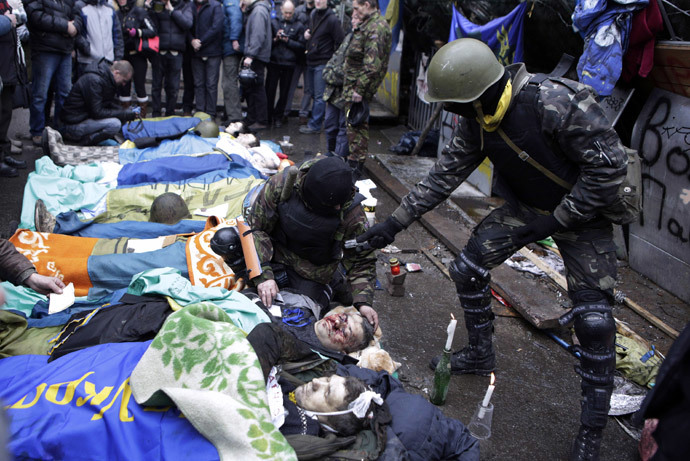
Speaking later on Thursday, acting Interior Minister Arsen Avakov identified the unit commander under the investigation as Dmitry Sadovnik. He added that the police officers are suspected of killing 17 protesters.
The acting minister also reported of an alleged conspiracy between former senior Interior Ministry officials and several civilians to stage attacks on protesters. Avakov didn’t provide any details on who could have killed police officers during the stand-off, citing an ongoing investigation.
Meanwhile the new head of the Ukrainian Security Service Valentin Nalivaichenko accused Yanukovich of planning the mass killings “under the guise of a counter-terrorist operation.” The ousted president earlier denied giving orders to shoot at protesters, saying that shedding the blood of Ukrainians is something he would never do.
Nalivaichenko also confirmed that the investigation suspects as many as 108 members of the elite Alpha group of the Ukrainian Security Service of participating in the mass killings. The theory of Alpha involvement was earlier reported by the Daily Beast. The report prompted comments from Olga Bogomolets, an influential Maidan activist and presidential hopeful, who said it casts doubt on the Ukrainian investigation into the killings, which may be conducted by the same people who committed the crimes.
The identity of the ‘Maidan snipers’ is a hot political topic both domestically and internationally. A leaked conversation between EU foreign affairs chief Catherine Ashton and Estonian Foreign Minister Urmas Paet discussed a “stronger understanding” that somebody among the new Ukrainian authorities were behind the snipers.
Yanukovich, in his latest interview, said the radical part of the Maidan responded with sniper fire to an agreement he signed with opposition leaders, which among other things resulted in the pullback of security troops from Kiev.
Earlier Aleksandr Yakimenko, the man who headed the Ukrainian Security Service at the time of the confrontation, said the so-called Maidan Self-Defense Force was controlling the building, from which snipers killed people in the Kiev streets. He said he believes the snipers could be mercenaries from former Yugoslavia.
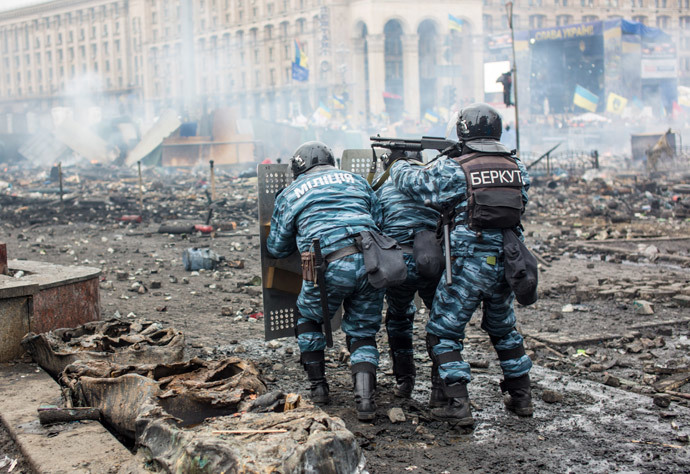
Moscow sees another likely culprit in the killings. The radical Right Sector group is responsible for many crimes during the protest and was likely behind the snipers as well, Foreign Minister Sergey Lavrov said in an interview on Sunday.
While the Right Sector and the Maidan Self-Defense Force were both involved in violent confrontations with the police during the Kiev protests, the two organizations have different leaders and a different history with the new Ukrainian authorities.
The Self-Defense Force answered to Andrey Parubiy, who now chairs the Ukrainian National Defense Council. Many members of the force have enlisted into the freshly created Ukrainian National Guard, which de facto legitimized the paramilitary organization.
Right Sector on the other hand is now at odds with the authorities following a number of incidents, including the death of one of its leaders, Aleksandr Muzychko, in a police raid aimed at arresting him and a shooting by a Right Sector activist at Kiev deputy mayor followed by a police siege of the Right Sector headquarters in Kiev. The confrontation culminated in a parliamentary decree demanding disarmament of illegal armed groups in Ukraine, with the Right Sector as the prime target of the crackdown.
Both Russia and the West, at odds on many issues over the Ukrainian crisis, agree that an impartial and comprehensive investigation into the sniper case was essential for future stability in the country. But with signals coming from the investigation looking incoherent, the Ukrainian authorities may be tempted to spin the case for political gains, either domestic or international.



